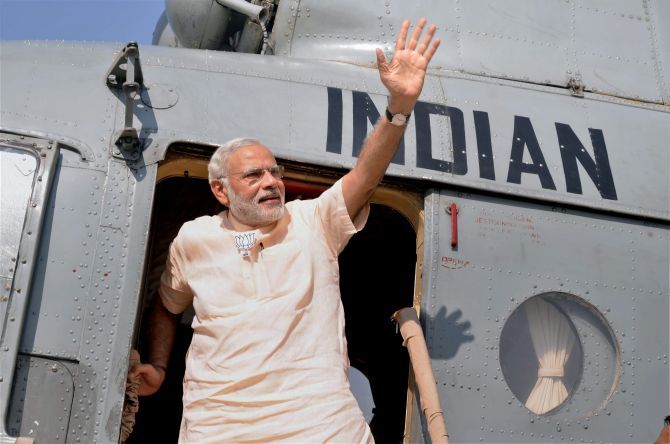What will be achieved by the prime minister's condemnation of each and every unfortunate incident? Will just the PM's condemnation bring about closure to these cases, asks Sudhir Bisht.

The detractors have been sharpening their knives for a long time and they seem to have reached a tipping point.
Prime Minister Narendra Modi is under attack from all sides. Ultra-leftists. Secularists. Peaceniks. Socialists. Communists. All are having a field day, with the media backing them to the hilt.
The recent criticism of Modi is also coming from a bunch of writers who may have won the Sahitya Akademi Award a long ago, but are largely inconsequential to the common man at this point in time.
Everyone has only one reason for his or her attack on the prime minister.
'Why is Modi so quiet on the Dadri lynching? Why did he not condemn the Kalburgi murder?' Everyone wants to know.
I am sure that by tomorrow a fresh chorus would start: 'Why is he not condemning the blackening of Sudheendra Kulkarni's face?'
The prime minister and his government are being blamed, indirectly or even directly, for allowing the build-up of a majoritarian atmosphere in the country.
But who are these people who are doing the blaming?
Who do they represent?
What are their values?
What do they seek to achieve by criticising Modi?
I thought over it for a long time and to me the only plausible reason for this irrelevant set of leftists to go on an overdrive against Modi is to get back their space in the country.
Nayantara Sahgal, who is known more for being Jawaharlal Nehru's niece than for anything else, said it on NDTV. 'What is the use of building smart cities in India if the people residing in those cities think that the Ganesha idol can drink milk!' she asked
'Will the real Narendra Modi stand up please?' asked Indira Gandhi's cousin, still living in the halcyon days when her nephew Rajiv Gandhi, the gentleman prime minister, would still greet his estranged aunt on her birthday.
For Sahgal, it is impossible to reconcile to the fact that the present government is run by those who still offer milk to Shivlings and what have you. That the former praja has taken over from the scions of her dear Nehru uncle appears to be a source of distress for her.
All these intellectuals want Modi to speak on the Dadri lynching and the Kalburgi killing.
These intellectuals, most of who are past their sell-by date, have their facts horribly wrong.
Kalburgi's murder was committed in Dharwad which falls in Karnataka. The state is governed by the Congress party. To proclaim that Kalburgi was killed by extremist Hindu right-wingers is at best a surmise, but Ashok Vajpeyi wants the prime minister to condemn Hindus nevertheless!
The Dadri lynching was carried out in the state of Uttar Pradesh. Sahgal and her cohorts should hold demonstrations outside the Uttar Pradesh chief minister's home as the Government of India has nothing to do with the law and order or communal situation in any Indian state.
Even the prime minister condemned the Dadri killing recently. He didn't name the place in his speech because he knows that his well-knit detractors would manufacture another counter-narrative and vitiate the atmosphere even more.
And the PM made the condemnation only after the home ministry received a report from the Akhilesh Yadav's government last week; the report was only recently forwarded to the PMO.
I want to ask some questions of these detractors about the PM.
What will be achieved by the prime minister's condemnation of each and every unfortunate incident?
Will just the condemnation by the PM bring about closure to these cases?
Don't our intellectual friends, who are happy with scoring a pseudo win by extracting an apology for the acts of violence, realise that the wheels of justice must aim at catching the criminals and bringing them to justice?
Modi is still held responsible for the Gujarat riots, which erupted after the Godhra carnage in 2002. Despite not a single charge been proved in the courts against his administration for being complicit with the rioters, the PM has to carry the cross of the Gujarat riots on his shoulders. Till today.
Even though it is a matter of fact that a record number of rioters -- Hindus incidentally -- were shot at and felled by the security forces in Gujarat, the bigoted media and the diminishing crowd of intellectuals always want to paint Modi as the antagonist of the minorities.
I welcome Modi's studied silence on Dadri.
I know that his ministers have assured the state administration of all support in dealing with the menace of violence in the name of religion.
I think it is enough if the home minister or the defence minister of India speaks against the condemnable acts committed by groups of vested interests. The prime minister is the first among equals in the Cabinet and if his ministers have spoken, then it is a given that he too has spoken.
Should the debate be centred only on the speech (or lack of it) of the prime minister?
Should India as a whole not look at the dangers of communalism?
Should we not identify the root cause of the growing virus of intolerance?
The fact that a convicted politician is at the centre of providing fodder for all vituperative and fissure-causing forces in Bihar is what should alarm the Sahgals and the Vajpeyis of the country.
Instead, let us challenge the PM on the price of toor ki daal that threatens to touch Rs 200 a kg soon.
Sudhir Bisht (@sudhir_bisht) is a published author and a New Delhi-based columnist.
IMAGE: Prime Minister Narendra Modi at an election rally in Bihar. Photograph: PTI Photo.











 © 2025
© 2025